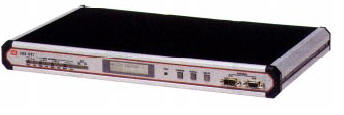|
FEATURES
- The IMX-4E1 Inverse Multiplexer enables
splitting and transmitting a high speed data channel of up to 7.68
Mbps, over up to four E1 links. IMX-4E1 spans the bandwidth gap
between E1 and E3, providing increased bandwidth where services higher
than E1 are either not available or are too expensive.
- IMX-4E1 can be ordered with either 2 or 4 E1
links. For long range applications, an optional built-in LTU for each
of the links is available.
- Differential delays of up to 64 msec between
the E1 lines are tolerated. IMX-4E1 compensates for such delays, and
the original stream is reconstructed. The end-to-end delay of the
IMX-4E1 is not more than the maximum differential delay between the
links.
- The automatic rate fallback feature ensures
that the logical channel remains open even if individual E1 links
fail, by automatically dropping to the next lower rate. When failed
links are recovered, IMX-4E1 automatically returns to original rate.
- IMX-4E1 provides immediate connection to
installed applications. The user data port is available with the
following sync data interfaces: V.35, RS-530, V.36/RS-449, X.21 or
HSSI. The data rate can be any multiple of 1.92 Mbps, up to a total of
7.68 Mbps.
- An Ethernet Bridge port can be ordered instead
of a sync data port interface. The Ethernet bridge port option allows
direct connection to LAN and provides self learning and extensive
packet filtering. The Ethernet bridge has 10BaseT (UTP) interface, and
fully complies with IEEE 802.3.
- The Ethernet bridge uses an Enhanced Tinygram
compression algorithm, enabling it to utilize bandwidth more
efficiently and thus reduce the required number of E1 lines.
- Two user-selectable clock modes are available
for the sync type data port:
- DCE: IMX-4E1 provides both TX and RX clocks to user DTE.
- External-DCE: IMX-4E1 provides RX clock to user while receiving TX
clock from user.
- Note: Ethernet port operates in DCE only
- System timing options include:
- Internal clock: the internal oscillator is the source for E1 links.
- Loopback: the E1 transmit clock is derived from one of the E1
receive clocks.
- Station clock: the E1 transmit clock is the source for
framed/unframed all "1"s or G.703 compatible.
- Setup, control, status, alarms and diagnostic
information are provided via the front panel LCD display or an ASCII
terminal/Telnet.
- Diagnostics capabilities include:
- Local/remote data port loopback
- Local/remote E1 links loopback
- V.52 BERT.
- Diagnostics can be executed via the front panel
or ASCII terminal (connected to supervisory port).
- The supervisory port supports dial-in/dial-out
for remote out-of-band configuration and monitoring (dial-in), as well
as for alarm reporting (dial-out).
|
SPECIFICATIONS
- Provides inverse multiplexing to transmit a single
high speed data channel over up to 4 E1 links
- Data rates from 1.92 to 7.68 Mbps, with automatic
rate fallback
- Sync data port interfaces: V.35, RS-530,
V.36/RS-449, X.21 or HSSI
- Optional full remote Ethernet bridge for data port
- Complies with ITU-T Rec. G.703, G.704, G.823
- Several system and data port timing options
- Compensates for differential delays up to 64 msec
- Built-in BERT (V.52) and remote/local loopbacks
- Control via front panel or ASCII terminal
IMX-4E1/#/*/%
E1 Inverse Multiplexer
| # |
Specify number of E1 links
2 for 2 E1 links
4 for 4 E1 links |
| * |
Specify data port interface
V35 for V.35 interface
530 for RS-530 interface
V36 for V.36/RS-449 interface (via supplied conversion cable)
X21 for X.21 interface
HSSI for high speed serial interface
ET for Ethernet port (UTP interface) |
| % |
Specify LTU for built-in LTU (default is
without LTU) |
ORDERING
IMX-4T1/2/530
IMX-4T1/2/530/CSU
IMX-4T1/2/ET/CSU
IMX-4T1/2/HSSI
IMX-4T1/2/V35
IMX-4T1/2/V35/CSU
IMX-4T1/4/530
IMX-4T1/4/530/CSU
IMX-4T1/4/ET
IMX-4T1/4/ET/48
IMX-4T1/4/ET/CSU
IMX-4T1/4/ET/QH/CSU
IMX-4T1/4/HSSI
IMX-4T1/4/HSSI/CSU
IMX-4T1/4/V35
IMX-4T1/4/V35/CSU
APPLICATIONS

|

